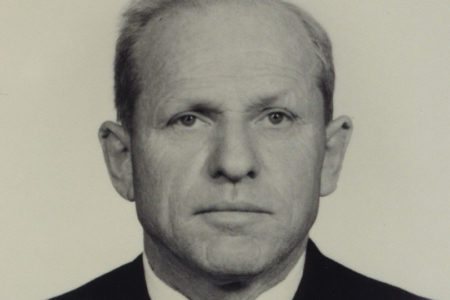Highway to Holiness 1 Peter 1:22–2:10
Many believers today love to sing worship choruses about holiness, but most have no idea how to achieve the holiness of which they sing. Our churches today are experiencing a huge disconnect between sentiment and reality, between Sunday emotion and weekly fulfillment. How does one become holy?
Writing to believers undergoing severe testing of their faith, the apostle Peter exhorted Christians to holiness as the proper means of enduring their trials. Rather than letting them off easy, he urged, “But as He who called you is holy, you also be holy in all your conduct” (1 Pet. 1:15). How does one accomplish that, you ask? In 1 Peter 1:22—2:10, Peter explained.
Love Earnestly (1:22–25)
Peter did not start with the mind. Instead, he began with the heart: “Love one another fervently” (1:22). Loving means putting someone else’s welfare above your own. Many years ago when my sons were little, they found two mangy stray kittens in the neighborhood. Although my mother, who was visiting us, detested cats, her love for her grandsons compelled her to help them bottle-feed the kittens back to health. I was amazed at what love did.
God is holy, completely unique, in His ability and propensity to love: “For God so loved the world that He gave His only begotten Son, that whoever believes in Him should not perish but have everlasting life” (Jn. 3:16). God’s children become holy, set apart to Him, when they emulate that love for one another.
Fervently indicates the strenuous nature of loving as God loves. This same adverb, translated “earnestly” in Luke 22:44, pictures the intensity involved: “And being in agony, He prayed more earnestly. Then His sweat became like great drops of blood falling down to the ground.”
There are three reasons to love fervently. First, that’s how God loves. Second, these believers had made a commitment: “Since [because] you have purified your souls in obeying the truth through the Spirit,…love one another fervently with a pure heart” (1 Pet. 1:22). Since they had already turned from selfishness, Peter urged them to flesh out that commitment.
Third, it is why they were born: ”Having been born again, not of corruptible [perishable] seed but incorruptible, through the word of God which lives and abides forever” (v. 23). One might say we were born (again) to love. We are no longer to live in the old nature but in the new one, which is born of God and fashioned after Jesus Himself. Fervently loving one another manifests who we really are. Those born of imperishable seed should manifest imperishable love.
Why did Peter start with love? Because love is relational. Knowledge without love produces arrogance (1 Cor. 8:1). Obedience always paves the way for instruction. Love must precede learning for us to grow in holiness. This exercise is spiritual, rather than academic, which may explain why there is so much immaturity in our churches despite the abundance of Bible teaching and Bible study materials. Maturity depends not only on learning but on loving.
Learn Eagerly (2:1–3)
Next Peter told his readers to learn eagerly:
Therefore, laying aside all malice, all deceit, hypocrisy, envy, and all evil speaking, as newborn babes, desire [long for] the pure milk of the word, that you may grow thereby (1 Pet. 2:1–2).
Nothing creates hunger like hard work. Strenuously loving our brothers should produce hunger for additional teaching. But why would Peter have to command this longing for the Word? Apparently some look elsewhere for answers to the hardships involved in loving their brothers. Perhaps some look to human psychology, interpersonal manipulation, or worldly ideas of self-preservation.
But Scripture tells us to rely on our natural sustenance. The image of a nursing mother is strong here. Mother’s milk is to an infant as God’s Word is to a believer. A hungry baby lets everyone know it. No malice, deceit, or hypocrisy. We have been born of God’s Word (an imperishable seed) and should long for the milk of that Word. We are to be like those newborns.
Second, that longing must replace wrong attitudes. Some no doubt responded inappropriately to the challenges of loving one another. The phrase putting aside is always used in the New Testament for removing one thing in favor of another. Malice and deceit suggest that ill will and deception crept into the brethren’s interpersonal relationships. Hypocrisy and envy indicate the presence of jealousy and absence of transparency. The words evil speaking reveal these feelings were vocalized publicly, as in a typical family when love is stretched to the breaking point.
Third, Peter commanded this longing for the Word because the taste for a healthy diet must be nurtured. With all unholy behavior put aside, God’s Word—our natural sustenance—should now be consumed like milk in a house full of youngsters.
Our appetite for God’s Word must be cultivated. Believers who have tasted and seen that the Lord is good must not let the junk food of life destroy their longing for true nourishment. If you have lost your appetite for God’s Word, recultivate it by reading your Bible regularly. Obedience (loving fervently) and spiritual hunger (learning eagerly) produce holiness.
Labor Enthusiastically (2:4–10)
The third step to holiness is exercise. “Coming to Him as to a living stone,…you also, as living stones, are being built up a spiritual house” (vv. 4–5). The context suggests a mild command. Some read the phrase are being built up as “let yourselves be built up,” while others render it “build yourselves up.” Clearly, this building up results from believers “coming to Him.” So we must make ourselves available for service as part of the royal priesthood that Jesus is building.
Moses’ Law established the Levitical priesthood to serve the nation of Israel in a physical house (Temple). The new economy recognizes every believer as a priest in a spiritual house. But this “priesthood of believers” does not mean we are priests in isolation. Each believer is a “living stone” in a “living house,” which is a holy priesthood. We must labor enthusiastically because the integrity of the house depends on each stone.
The living house of this dispensation is the church. Israel has stumbled temporarily over the manner in which its Messiah came the first time. So, until He comes again, Jesus is the Cornerstone of a spiritual house—His church—which He said He will build (Mt. 16:18).
This living and holy temple is the means by which God glorifies Himself in this world until the day He reconstructs Israel’s Temple for Messiah’s Kingdom. All genuine believers, both Jewish and Gentile, should work together “to offer up spiritual sacrifices acceptable to God through Jesus Christ” (1 Pet. 2:5).
This highway to holiness is essential, then, for the church because this interim “chosen generation” that Peter also called “a royal priesthood, a holy nation, His [God’s] own special people” is intended to “proclaim the praises of Him who called you out of darkness into His marvelous light” (v. 9).
Until the “natural branches [the Jewish people], be grafted into their own olive tree” (Rom. 11:24), the wild olive branches (Gentiles) must live and labor together in such a way as to reflect God’s glory and holiness to the world around them.
So don’t let your trials distract you from the highway to holiness.








1 thought on “Highway to Holiness 1 Peter 1:22–2:10”